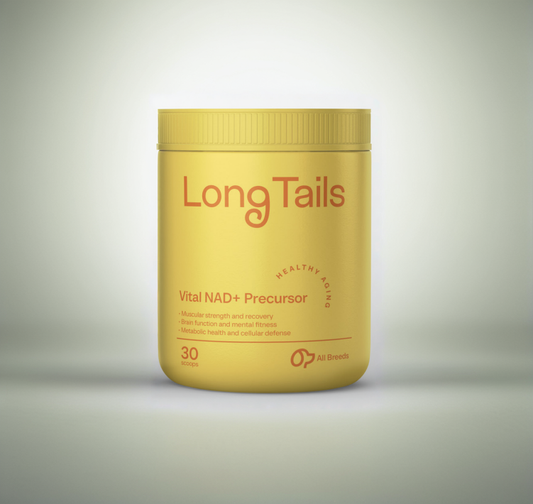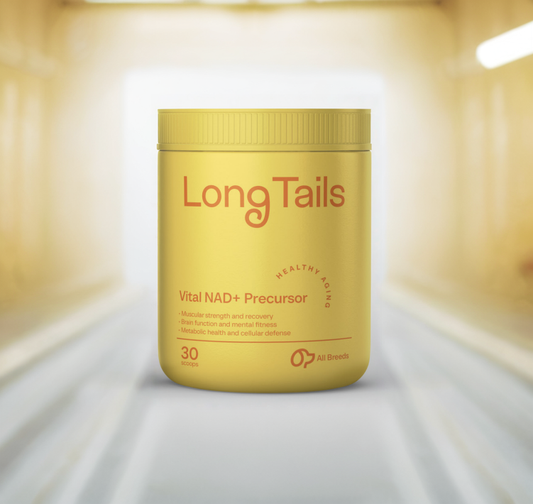Pyridoxal-5-Phosphate: The Active Form of Vitamin B6 That May Support Your Dog's Brain Health and Well-Being

Pyridoxal-5-Phosphate: The Active Form of Vitamin B6 That May Support Your Dog's Brain Health and Well-Being
As pet parents, we're always looking for ways to support our furry friends' health and happiness. While a balanced diet, regular exercise, and plenty of love are the foundations of canine wellness, certain nutrients may offer additional benefits. One such nutrient is pyridoxal-5-phosphate (P5P), the active form of vitamin B6. This essential cofactor plays a crucial role in numerous enzymatic reactions, particularly those related to brain function and neurotransmitter balance. Let's dive into what the research says about the potential benefits of P5P for our beloved dogs.
What is Pyridoxal-5-Phosphate (P5P)?
Pyridoxal-5-phosphate is the biologically active form of vitamin B6, a water-soluble vitamin essential for various metabolic processes in the body. While vitamin B6 can be found in several forms, including pyridoxine, pyridoxal, and pyridoxamine, it must be converted to P5P to be utilized by enzymes.1
P5P serves as a cofactor for over 160 enzymatic reactions, many of which are involved in the synthesis and breakdown of neurotransmitters like serotonin, dopamine, and GABA. These neurotransmitters play crucial roles in regulating mood, cognition, and behavior, making P5P an important nutrient for brain health.2
Potential Benefits of P5P for Dogs
While research on P5P specifically in dogs is limited, studies in humans and other animals suggest several potential benefits that may extend to our canine companions:
1. Supporting Neurological Health
Given its critical role in neurotransmitter metabolism, P5P has been studied for its potential to support neurological health. In humans, insufficient levels of P5P have been linked to various neurological disorders, including seizures, peripheral neuropathy, and cognitive impairment.2
In a case report, a neonate with epileptic encephalopathy showed significant improvement in symptoms and neurodevelopmental outcomes after treatment with P5P.3 While more research is needed to confirm these effects in dogs, ensuring adequate P5P levels may help support healthy brain function and development.
2. Enhancing Enzymatic Function
As a cofactor for numerous enzymes, P5P is essential for various metabolic processes beyond neurotransmitter synthesis. These include protein metabolism, heme biosynthesis, and the metabolism of other nutrients like tryptophan and sulfur-containing amino acids.2
Interestingly, a study on a specific genetic disorder found that pyridoxamine and pyridoxal, two other forms of vitamin B6, were more effective than pyridoxine in restoring enzyme function.4 This suggests that different forms of vitamin B6 may have varying therapeutic effects, with P5P being the most biologically active.
3. Potential Protective Effects
Some research suggests that P5P may offer protective effects against various toxins and stressors. In a rat study, P5P extended survival time and increased the lethal dose of cyanide, spermine, and gentamicin, indicating its potential as an antidote for these toxicants.5
While the specific mechanisms and relevance to dogs require further investigation, these findings hint at P5P's potential to support the body's natural defenses and resilience.
Is P5P Supplementation Safe for Dogs?
P5P is generally considered safe when consumed in appropriate amounts. However, it's important to note that the body tightly regulates P5P levels, and there appears to be a limit to how much can be increased through supplementation.6
As with any new supplement, it's crucial to consult with your veterinarian before giving P5P to your dog. They can help you determine if it's appropriate for your individual dog's needs, health status, and current diet. Your vet can also guide you on proper dosage and recommend a high-quality, dog-specific supplement.
The Bottom Line
Pyridoxal-5-phosphate, the active form of vitamin B6, plays a vital role in numerous metabolic processes, particularly those related to brain function and neurotransmitter balance. While more dog-specific research is needed, the available evidence suggests that ensuring adequate P5P levels may support neurological health, enhance enzymatic function, and potentially offer protective effects.
As always, work closely with your veterinarian when considering any new supplement for your furry friend. With their guidance and a commitment to a balanced, species-appropriate diet, P5P may be one piece of the puzzle in supporting your dog's overall health and well-being.
References:
-
Ubbink, J. B., Serfontein, W. J., Becker, P. J., & De Villiers, L. S. (1987). Effect of different levels of oral pyridoxine supplementation on plasma pyridoxal-5'-phosphate and pyridoxal levels and urinary vitamin B-6 excretion. The American journal of clinical nutrition, 46(1), 78-85. https://doi.org/10.1093/AJCN/46.1.78
-
di Salvo, M. L., Safo, M. K., & Contestabile, R. (2012). Biomedical aspects of pyridoxal 5′-phosphate availability. Frontiers in bioscience (Elite edition), 4(3), 897-913. https://doi.org/10.2741/428
-
Guerin, A., Aziz, A. S., Mutch, C., Lewis, J., Go, C. Y., & Mercimek-Mahmutoglu, S. (2015). Pyridox (am) ine-5-phosphate oxidase deficiency treatable cause of neonatal epileptic encephalopathy with burst suppression: case report and review of the literature. Journal of child neurology, 30(9), 1218-1225. https://doi.org/10.1177/0883073814550829
-
Oppici, E., Fargue, S., Reid, E. S., Mills, P. B., Clayton, P. T., Danpure, C. J., & Cellini, B. (2015). Pyridoxamine and pyridoxal are more effective than pyridoxine in rescuing folding-defective variants of human alanine: glyoxylate aminotransferase causing primary hyperoxaluria type I. Human molecular genetics, 24(19), 5500-5511. https://doi.org/10.1093/hmg/ddv276
-
Keniston, R. C., Cabellon Jr, S., & Yarbrough, K. S. (1987). Pyridoxal 5'-phosphate as an antidote for cyanide, spermine, gentamicin, and dopamine toxicity: an in vivo rat study. Toxicology and applied pharmacology, 88(3), 433-441. https://doi.org/10.1016/0041-008X(87)90217-1
-
Ubbink, J. B., Serfontein, W. J., Becker, P. J., & De Villiers, L. S. (1987). Effect of different levels of oral pyridoxine supplementation on plasma pyridoxal-5'-phosphate and pyridoxal levels and urinary vitamin B-6 excretion. The American journal of clinical nutrition, 46(1), 78-85. https://doi.org/10.1093/AJCN/46.1.78
This article is for informational purposes only. It is not, nor is it intended to be, a substitute for professional medical or veterinary advice, diagnosis, or treatment and should never be relied upon or perceived as specific medical or veterinary advice.
We recognize there may be different points of view or opinions on some aspect or even the premise of this article. Our goal at LongTails is to provide the best, clearest, and most helpful information possible to help keep your dog happy, healthy and safe.



